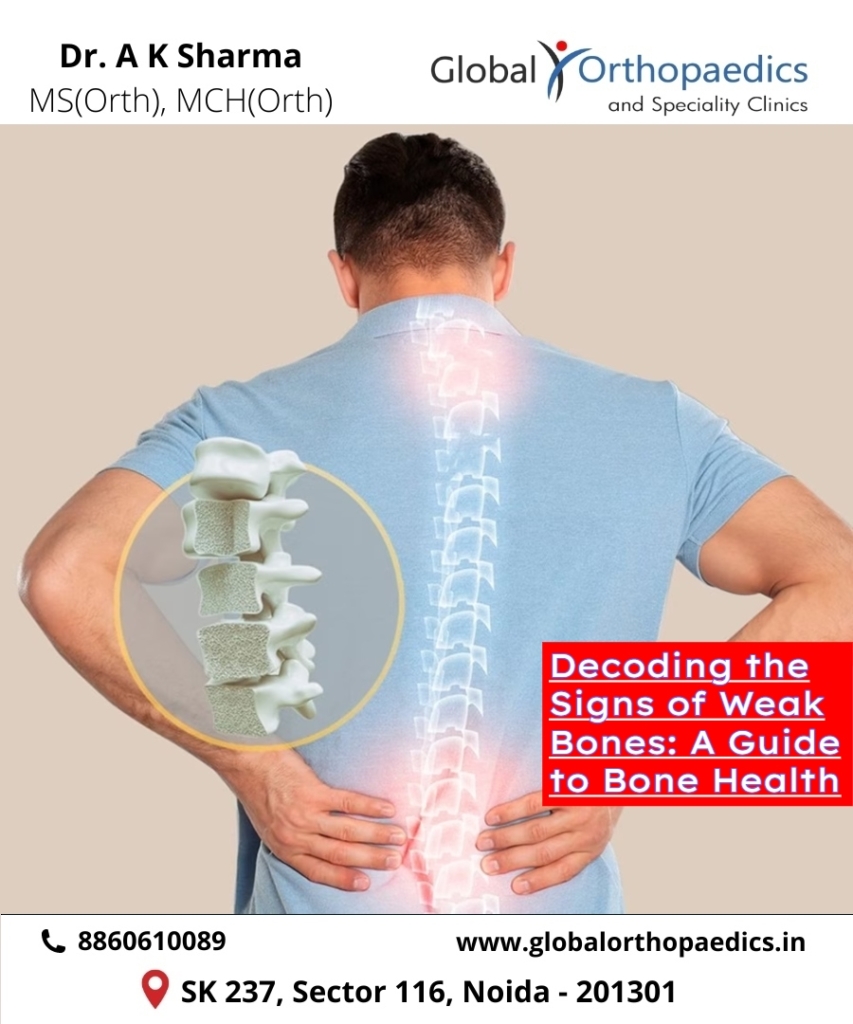Strong, healthy bones are essential for overall well-being. However, various factors can weaken bones over time, leading to conditions like osteoporosis and fractures. Recognizing the signs of weak bones can help you take proactive steps to protect your skeletal health.

Common Signs of Weak Bones
- Frequent Fractures:
- Experiencing fractures from minor falls or bumps can be a significant indicator of weak bones.
- If you’re prone to fractures, it’s crucial to consult an orthopedic doctor to assess your bone health.
- Loss of Height:
- As we age, it’s normal to lose some height. However, a sudden or significant decrease in height can be a sign of vertebral compression fractures, a common consequence of weak bones.
- Back Pain:
- Chronic back pain, especially in the lower back, can be a symptom of weakened vertebrae.
- If you experience persistent back pain, seek medical advice to rule out any underlying bone health issues.
- Postural Changes:
- Noticeable changes in posture, such as stooped shoulders or a hunched back, can be indicative of weakened bones in the spine.
- Maintaining good posture and engaging in regular exercise can help prevent these changes.
- Joint Pain:
- Weak bones can lead to joint pain, especially in weight-bearing joints like the hips and knees.
- If you experience persistent joint pain, consult an orthopedic doctor for a proper diagnosis and treatment plan.
Factors Contributing to Weak Bones
Several factors can contribute to weak bones, including:
- Age: Bone density naturally declines with age, especially in postmenopausal women.
- Hormonal Changes: Hormonal imbalances, particularly a decrease in estrogen levels, can weaken bones.
- Nutrition: A diet lacking in calcium and vitamin D can impair bone health.
- Sedentary Lifestyle: Lack of physical activity can weaken bones.
- Certain Medications: Some medications, such as corticosteroids, can increase the risk of bone loss.
- Medical Conditions: Conditions like rheumatoid arthritis and hyperthyroidism can affect bone health.
Preventing and Managing Weak Bones
To maintain strong, healthy bones, consider the following tips:
- Healthy Diet: Consume a diet rich in calcium and vitamin D. Dairy products, leafy green vegetables, and fortified foods are excellent sources of calcium. 1 Sunlight exposure helps your body produce vitamin D.
- Regular Exercise: Engage in weight-bearing exercises like walking, jogging, and weightlifting to strengthen your bones.
- Limit Alcohol and Tobacco: Excessive alcohol consumption and smoking can negatively impact bone health.
- Consult an Orthopedic Doctor: Regular check-ups with an orthopedic doctor near me can help monitor your bone health and identify any potential issues early on.
If you’re looking for expert advice and treatment for bone health issues, consider consulting with Dr. Ashok Kumar Sharma. He is a highly qualified and experienced orthopedic surgeon in Noida who specializes in diagnosing and treating various bone-related conditions.
By understanding the signs of weak bones and taking proactive steps to maintain bone health, you can reduce your risk of fractures and improve your overall quality of life.


